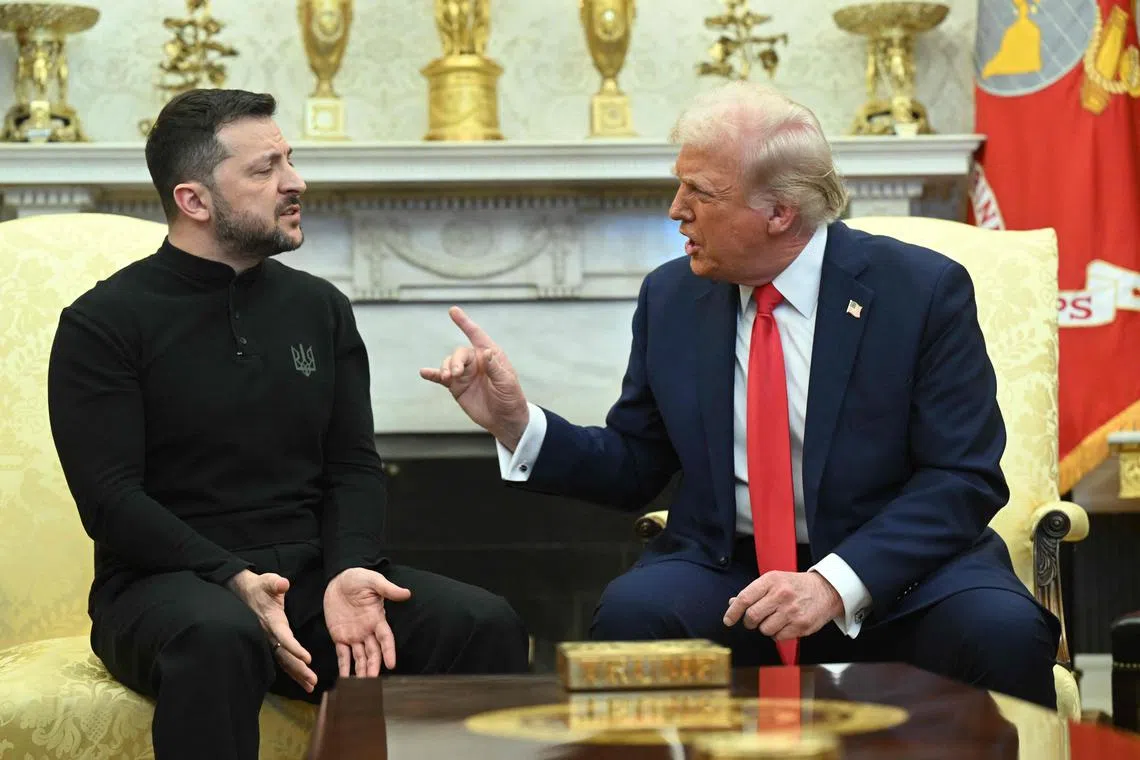Trump lashes out at Zelensky for not accepting Crimea loss to Russia
Sign up now: Get ST's newsletters delivered to your inbox

Ukrainian President Volodymyr Zelensky (left) and US President Donald Trump clashing over Russia's invasion of Ukraine at the White House on Feb 28.
PHOTO: AFP
WASHINGTON – US President Donald Trump lashed out at Ukrainian President Volodymyr Zelensky on April 23, blaming the Ukrainian leader’s refusal to accept Russian occupation of Crimea for failure to end the war.
As the leaders traded accusations, the Ukrainian authorities issued an alert for an “enemy missile” attack on Kyiv, with explosions heard across the capital.
Mr Trump said a deal was “very close” – and effectively closed with Moscow – but Mr Zelensky was proving “harder” to negotiate with.
The Ukrainian leader’s refusal to accept US terms for ending the conflict – which began with Russia’s invasion – “will do nothing but prolong the ‘killing field’”, he added.
“I think we have a deal with Russia. We have to get a deal with Zelensky,” Mr Trump told reporters. “I thought it might be easier to deal with Zelensky. So far, it’s been harder.”
Ahead of Mr Trump’s broadside, Vice-President J.D. Vance laid out the US vision for a peace deal where Russia would get to keep already occupied swathes of Ukraine, which include Crimea.
Mr Zelensky rejected this as a violation of Ukraine’s Constitution.
That in turn prompted Mr Trump’s outburst, in which he accused Mr Zelensky of “boasting” and taking a position “very harmful to the peace negotiations with Russia”.
Mr Zelensky “can have peace or, he can fight for another three years before losing the whole country”, Mr Trump wrote on Truth Social.
The US President said Crimea – a lush Black Sea peninsula with long-time major Soviet and Russian naval facilities – “was lost years ago” and “is not even a point of discussion”.
Mr Zelensky responded by posting on social media a 2018 “Crimea declaration”
Weeks into a US-initiated process, Mr Trump’s patience was “running very thin”, White House spokeswoman Karoline Leavitt said.
Intense US pressure on Ukraine to accept a deal comes after Mr Trump regularly boasted on the campaign trail that he would resolve the conflict in 24 hours.
He has put no equivalent visible pressure on Russia, while dangling a lifting of massive US economic sanctions against Moscow if the fighting stops.
‘Freeze’ Russia’s gains
Mr Vance earlier gave the fullest public explanation of the US plan so far, saying that the deal would “freeze the territorial lines at some level (that was) close to where they are today”.
While on a trip to India, he said: “The Ukrainians and the Russians are both going to have to give up some of the territory they currently own.”
Freezing the front lines would mean Ukraine losing huge areas to Russian occupation.
Mr Vance did not explain what territory Russia – which seized Crimea in 2014 and launched a full-scale invasion
It was time for Moscow and Kyiv “to either say ‘yes’, or for the United States to walk away from this process”, he said.
Growing speculation over Washington being ready to recognise Russian rule over Crimea
French President Emmanuel Macron’s office said: “Ukraine’s territorial integrity and European aspirations are very strong requirements for Europeans.”
A spokesperson for British Prime Minister Keir Starmer told reporters that “it has to be up to Ukraine to decide its future”.
UK Foreign Secretary David Lammy had been due to lead a meeting of foreign ministers in London on April 23.
Top Ukrainian officials wrapped up a round of talks in London on April 23 with representatives from Britain, France, Germany and the US.
US presidential envoy Steve Witkoff is to visit Moscow this week, and Mr Trump said he would likely meet Russian President Vladimir Putin shortly after his trip to the Middle East in mid-May.
Russian bombing
The latest diplomatic wrangling comes after a fresh wave of Russian air strikes that shattered a brief Easter truce.
A Russian drone strike on a bus
The Ukrainian authorities also reported strikes in the regions of Kyiv, Kharkiv, Poltava and Odesa.
In light of the attacks, Mr Zelensky called for an “immediate, full, and unconditional ceasefire”. AFP


